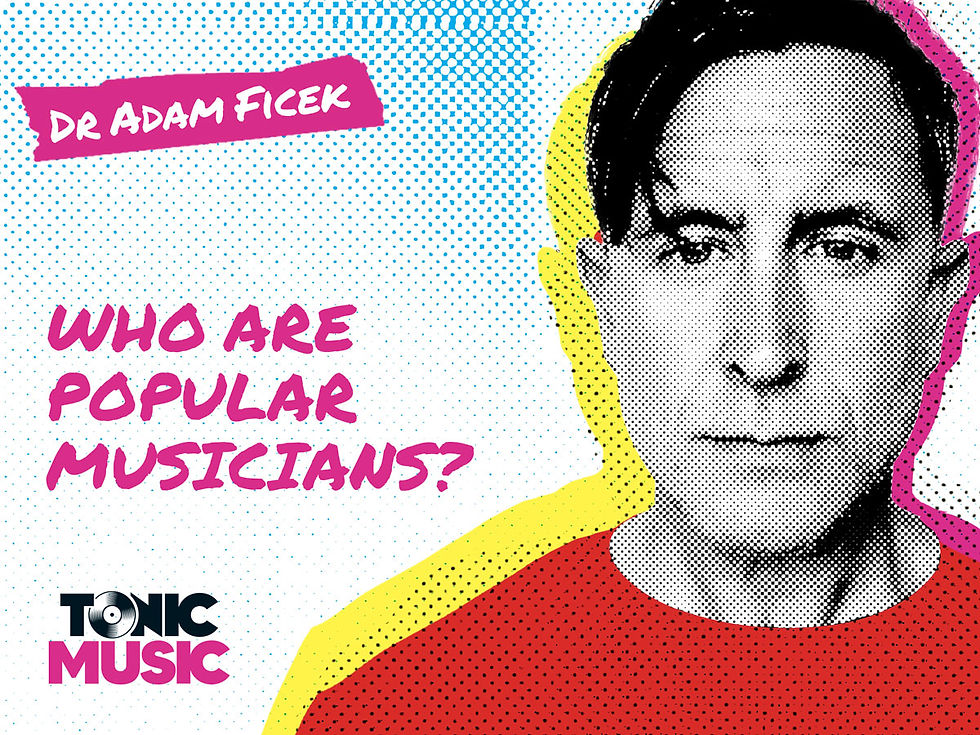Who Are Popular Musicians?
- Team Tonic

- Mar 10, 2025
- 3 min read
Moving slightly away from (but not forgetting) the grass roots world, creativity and other ventures, in this week’s blog I wanted to explore another area surrounding popular musicians. It’s big and complex as usual... but who exactly are they, we, us? These ‘popular musicians’.

I often write about popular musicians, but it’s a big ambiguous area and I’m wary of being reductionistic. I view popular musicians (so do others) as anyone not doing the classical thing. Of course, this is far more nuanced these days and we are all overlapping to a certain extent. It’s a rich and diverse world. When I was studying to be a school teacher (secondary music) in North London I was always drawn to the work of Lucy Green who writes lots about how popular musicians learn.
In her book 'How Popular Musicians Learn: A Way Ahead for Music Education' (2002) she highlights the stark differences in learning approaches, environments, and the overall music-making processes between popular and classical musicians. She argues that popular musicians primarily learn through informal, self-directed processes which are significantly different to the formalised, structured education typical of classical musicians. She describes how popular musicians often start by playing along with recordings, figuring out songs by ear rather than relying on written notation. This aural tradition emphasises imitation, experimentation, and personal discovery, allowing some of us to do it our own way. This was true for myself, I initially bumbled along trying to copy my favourite bands. I didn’t have a teacher for a while and found my own way in the early years of playing the drums especially. This did change over time, and the help and guidance of a teacher proved invaluable.
Green describes this self-learning as 'enculturation', a process by which we absorb the music around us, often from a young age, by listening to and imitating our favourite artists. This process is informal and is driven by what she calls ‘intrinsic motivation’, as learners we choose what we want to play based on our musical tastes and aspirations. This is very different to the more externally motivated learning in classical music, where the curriculum and repertoire are often predetermined by teachers or institutions.
In her research, Green found that popular musicians also rely heavily on peer learning. We often form bands or groups where we learn from each other, copy our mates, share ideas, and develop skills collaboratively. This contrasts with the often-solitary practice associated with classical musicians, who may spend many hours alone perfecting their technique and interpretations before playing with others in an ensemble setting. In contrast to the informal learning processes of popular musicians, Green describes the education of classical musicians as highly formalised, structured, and hierarchical.
Classical music training typically begins with one-on-one instruction from a teacher who imparts knowledge about technique, theory, and repertoire. The learning process is largely focused on the reproduction of notated music, with an emphasis on accuracy, fidelity to the score, and the interpretation of works within a specific stylistic tradition. For some this may even be quite a comfort rather than the messy world of potential in the ‘popular’ environment.
Classical musicians also often start their training at a very young age, following a curriculum that gradually increases in complexity. The teaching approach is generally teacher-centred, with students expected to follow the teacher's guidance closely. This structured environment aims to develop technical proficiency and a deep understanding of musical theory, often at the expense of creativity and improvisation, which are more prominent in popular music learning.
I am aware as I write this that it does seem quite reductionistic but I’m leaning into Green’s writing without having experienced the classical learning world myself. Maybe someone reading this can put me straight on this? In a way, I do think there are good and bad in both classical and popular approaches and neither are better than the other.
At the end of the day... music is music, but I often wonder which route impacts our mental health more? Ideas anyone?

Adam Ficek hosts a monthly show 'Tonic Music' on Totally Wired Radio, where he talks to various guests about music and mental health. You can listen again to any of the previous show on the Tonic Music Mixcloud page.




